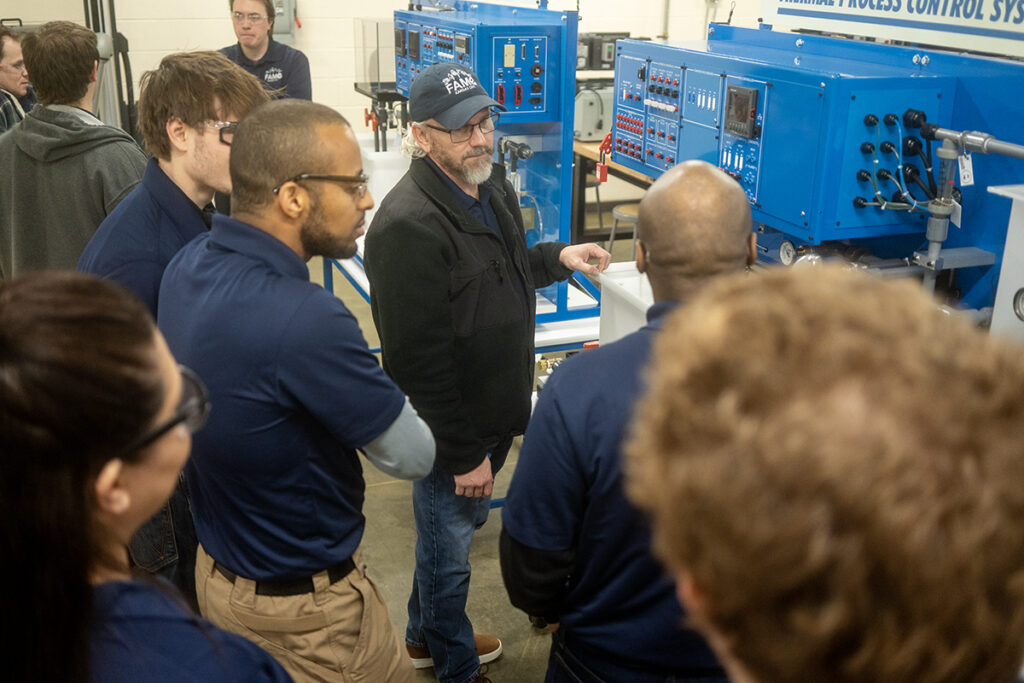In an innovative approach to workforce development, Kansas City Kansas Community College is offering a unique opportunity for students to gain hands-on experience in the burgeoning field of electric vehicle (EV) battery manufacturing. In collaboration with Panasonic, the college has launched an apprenticeship program that combines classroom education with practical training, paving the way for a new generation of skilled workers.
The program is designed to prepare students to work at Panasonic’s $4 billion electric vehicle battery factory in De Soto, Kansas—a facility anticipated to become the world’s largest of its kind. In this eight-week course, students learn about basic circuit boards by engaging with various components, and upon completion, they are expected to join the factory’s workforce when it opens in early summer. With an aim to eventually employ around 4,000 individuals, Panasonic has funded the students’ tuition and the instructor’s salary.
The Rise of Apprenticeship Programs
Apprenticeship programs like the one at Kansas City Kansas Community College are increasingly seen as essential to developing a skilled labor force. Such programs, born from partnerships between industry and educational institutions, offer credentials that align closely with employer needs, leading to high-skill, high-demand, high-wage careers. In this case, Panasonic worked with two Kansas colleges to adapt an existing curriculum to meet the specific demands of their new facility.
“We’re helping them build their workforce from the very beginning,” said Greg Mosier, president of Kansas City Kansas Community College.
Despite the program’s promise, recent policy changes under the Trump administration have introduced uncertainties. On his first day in office, President Donald Trump signed an executive order that reversed a Biden administration goal for electric vehicles, removed tax credits, and paused federal support for EV infrastructure. This has raised concerns about the potential impact on the EV industry and related job prospects.
Community Colleges at the Forefront
Amidst these challenges, community colleges nationwide are playing a pivotal role in training workers for the electric vehicle industry. Institutions like Pima Community College in Arizona, Richland Community College in Illinois, and Wake Technical Community College in North Carolina have initiated similar programs. In Kansas, the partnership between Kansas City Kansas Community College and Johnson County Community College resulted in a condensed eight-week course to quickly prepare students for employment at Panasonic’s new plant.
JCCC is also involved in training Panasonic supervisors who will later transition to roles within the factory, ensuring continuity and familiarity for new employees. These programs offer stackable credentials that contribute to associate and bachelor’s degrees, enhancing students’ educational and career prospects.
While federal policy shifts create uncertainties, local leaders like De Soto Mayor Rick Walker are optimistic about the long-term benefits of the Panasonic facility. The plant has already stimulated local economic growth, with new businesses emerging and increased sales tax revenue. Although concerns remain about potential funding cuts to community colleges, the demand for skilled workers in the EV sector continues to drive educational initiatives.
As the EV industry evolves, community colleges and industry partners like Panasonic are proactively addressing the need for a skilled workforce, ensuring that students like Justin Jefferson, who aspires to work at Panasonic, have the tools and opportunities to succeed in this dynamic field.
Original Story at hechingerreport.org
